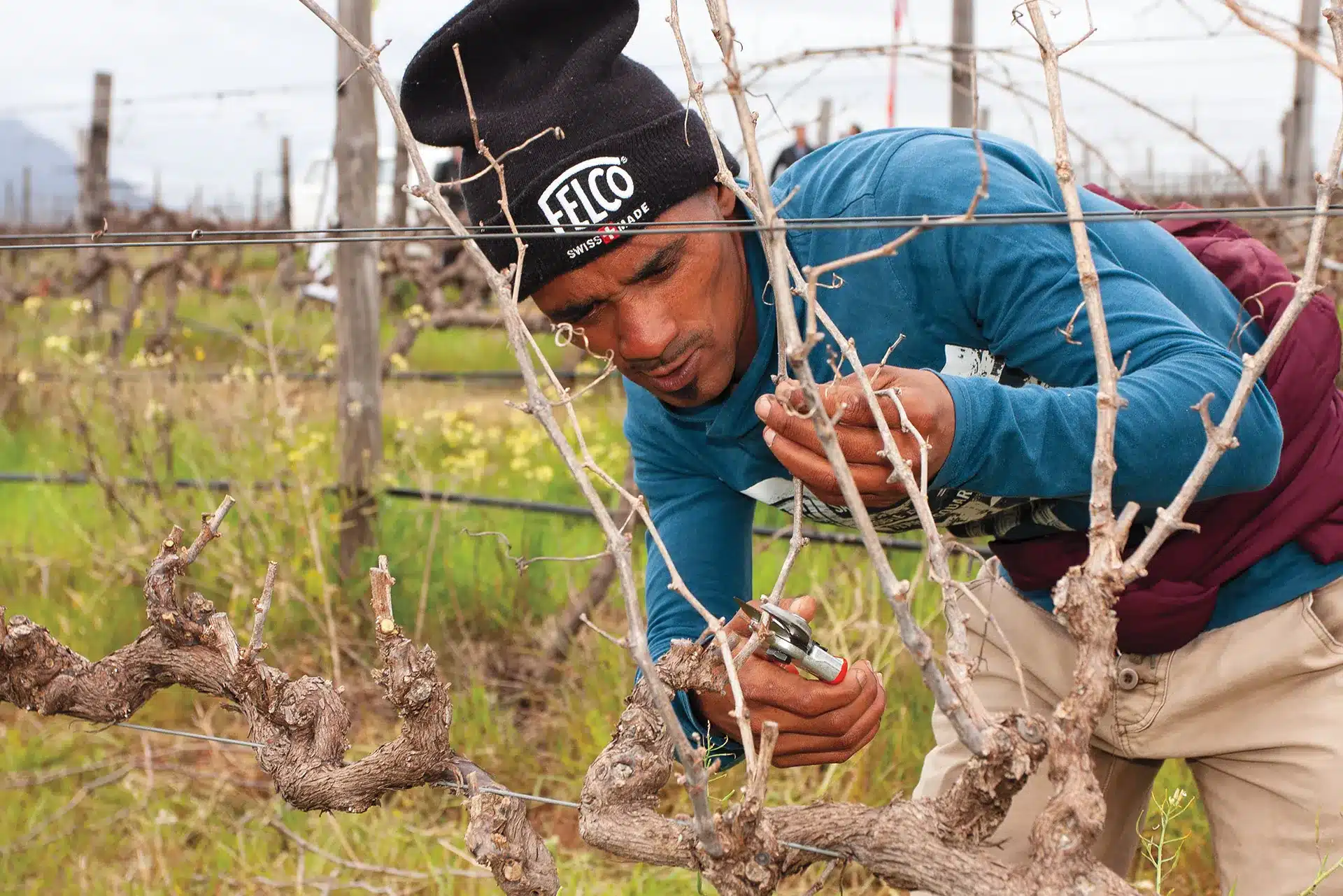Malu Lambert: Uprooted – why SA vineyards are disappearing
By Christian Eedes, 6 August 2025

“Not known, because not looked for / But heard, half-heard, in the stillness / Between two waves of the sea.”
Quoting T.S. Eliot, Jonathan Steyn, convener of UCT GSB’s Business of Wine course, underscored what it means to view the South African wine industry with fresh eyes. Critical thinking, he said, helps us discover what’s hidden in the margins.
During the programme, Yvette van der Merwe, OIV president and executive manager of SAWIS presented the latest industry stats. The 2024 data revealed that far more vines are being grubbed up than planted. Since its peak in 2006, the total area under vine has declined by over 15,600 hectares, that’s an average of 894 hectares per year.
In 2024 alone, 3,535 hectares were uprooted, compared to 1,542 plantings.
Unsurprisingly these numbers contribute to the loss of wineries too. Over the past 20 years, the industry has lost 2,085 producers. It’s a problem of profitability: farmers often lack cash flow to replant timeously. Planting vines is an expensive business, estimated at around R500,000 per hectare. Then at least five years before it’s a viable asset.
The data paints a picture of a rapidly ageing vineyard: soberingly in 2014, 18% of vines were over 20 years old. Today, that figure has more than doubled to 38%.
It’s not all bad news. There’s palpable energy in the fine wine segment, with top producers doubling down on quality. Particularly in Stellenbosch’s Helderberg.
Helderberg Mountain Vineyards (HMV), the majority shareholder in Ernie Els Wines and owner of Alto, Stellenzicht and Blyhoek, has initiated a 10-year ‘Vineyard Rejuvenation Programme’ set to culminate in by 2032.
“We want to ensure we are in control of quality by decoupling as much as possible from external supply,” explains Louis Strydom. Conveniently, the Ernie Els winemaker also sits on the board at Vititec, giving both him and HMV a strategic edge in vineyard health and clonal research.
While eradicating virus is a significant part of their strategy, the plan is to also shift towards a vine replacement strategy. “If you can reduce the virus to something immaterial, then farmers that do not have capital reserves can avoid large investment tranches by systematically rejuvenating blocks, row by row, or vine by vine. This way, they do not have large drops in producing hectares. Cash flow remains stable, and rejuvenation investment more manageable. The cultivation of older ‘in-boet’ vines that can better integrate with existing vineyards also becomes less risky virus-wise as well as practical.”
Similarly, Hidden Valley is undertaking a full replanting of its 24-hectare farm, focusing on Bordeaux varieties and chardonnay.
Chris du Toit, ex-Graham Beck and now CEO at the aforementioned concern, emphasises that: “Replanting is still not growth, we’re merely replacing what was there.”
Du Toit, who is writing his PhD on the bulk industry, says he is concerned for the long-term viability of that sector. He notes that only around 20% of the industry focuses on fine wine, while the remaining 80% is still bulk-driven. A major problem, he says, is that many wineries don’t understand their own financials. “You’ve got to get the basics right, before your business can grow.” The path forward he emphasises lies in premiumisation. Bulk wine is in decline, and global markets are shifting toward lighter styles and higher-quality drinking. “That’s the reality of where wine is headed.”
“Replanting a hectare here or there doesn’t move the needle. You need R2 million just to replant four,” commiserates Heinie Nel, group viticulturist for DGB. The company is currently replanting Klein Helderberg as well as Avontuur. Nel points out that leafroll virus is the bigger issue than vine age in terms of quality. Though he admits the two are linked. Many vineyards he says are still producing despite being too old and too diseased. “Producers are riding these vineyards until the wheels fall off.”
Though he observes, “We’ve been saying for 10 years there’ll be a shortage, and nothing has changed. We’re surviving because demand hasn’t outstripped supply. But that won’t last.”
One consequence of the ageing vineyard is that more producers are turning to their own plantings to secure fruit. “You need to be able to supply your own demand.” That said, Nel stresses the importance of supporting growers: “We can’t expect the industry to stay healthy without them.”
Catching up with Rosa Kruger, old vine champion and consultant vineyard manager, she reflected on recent seminars in France and Sardinia, where she presented on South Africa’s climate resilient farming and vineyard design strategies. “I’ve spoken with winemakers and academics from all over, and the reality is clear. Global wine consumption is declining, and producers everywhere are struggling to survive.”
One of our most pressing challenges, she says, is the lack of viticultural training. “There is a critical gap in vineyard expertise. Labour laws and a lack of industry culture around training make it difficult for producers to invest time and money into developing permanent, skilled workers.”
Despite this, she says there is a strong, unmet demand among farm workers eager to learn. “With trained vineyard workers, we could produce better wines and extend vineyard life, rather than ripping out vines as soon as production dips or leafroll virus takes hold.”
Planting for quality production, premiumisation of brands, vineyard training, sound business practices… The data may tell one story, but what’s hidden in the margins is the message that our industry needs to adapt across the value chain in order to grow.
- Malu Lambert is a freelance wine journalist and wine judge who has written for numerous local and international titles. She is a WSET Diploma alum and won the title of Louis Roederer Emerging Wine Writer of the Year 2019, among many other accolades. She sits on various tasting panels and has judged in competitions abroad. Follow her on X: @MaluLambert







Comments
0 comment(s)
Please read our Comments Policy here.